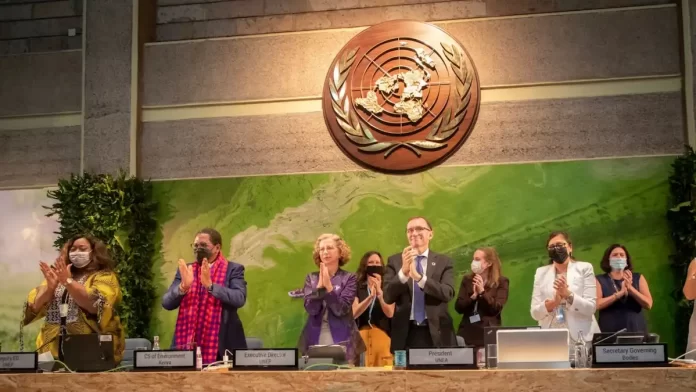United Nations Environment Assembly has adopted a historic resolution on Plastic Pollution at its fifth session that concluded on 2nd March 2022 in Nairobi, Kenya.
The resolution titled “End plastic pollution: Towards an international legally binding instrument” was adopted by 175 countries and it called for collective global actions to combat plastic pollution while respecting national circumstances and capabilities.
Significantly, on the insistence of India, the principle of national circumstances and capability while taking actions to address plastic pollution was included in the text of the resolution to allow developing countries to follow their development trajectories.
Immediate Collective Voluntary Actions
The provision for immediate collective voluntary actions by the countries was also included to address plastic pollution on an urgent and continual basis.
The assembly considered three draft resolutions to address plastic pollution with one being put forth by India. The draft resolution submitted by India had called for immediate collective voluntary action by countries.
India engaged constructively with all member states in UNEA 5.2 to develop consensus on the resolution for driving global action on plastic pollution by setting up an intergovernmental negotiating committee for a new international legally binding treaty.
India also stood for not mandating the intergovernmental negotiating committee with the development of targets, definitions, formats, and methodologies, at this stage, pre-judging the outcome of deliberations of the Committee.
After long protracted negotiations, the principal objectives of India’s draft resolution were sufficiently addressed in the adopted resolution on “End plastic pollution: Towards an international legally binding instrument”.
Terming the adoption by 175 countries as historic, Union Minister for Environment, Forest, and Climate Change, Shri Bhupender Yadav said that India has embarked on the journey to end plastic pollution by taking sound and effective measures through EPR on plastic packaging as well as putting a ban on single-use plastic items having low utility and high littering potential.
End plastic pollution: Towards an international legally binding instrument
Under the resolution, the Member States were called to continue and step up activities and adopt voluntary measures to combat plastic pollution.
These include measures related to sustainable consumption and production, which may include circular economy approaches, and developing and implementing national action plans.
At the same time, members are to foster international action and initiatives under respective national regulatory frameworks, and also on a voluntary basis to provide statistical information on environmentally sound management of plastic waste, as appropriate, taking into account their national circumstances.
The resolution requests the Executive Director to convene a forum in conjunction with the first session of the intergovernmental negotiating committee, building upon existing initiatives, where appropriate, that are open to all stakeholders to exchange information and activities related to plastic pollution.
Earlier, India had piloted a resolution on addressing single-use plastic product pollution in the fourth United Nations Environment Assembly (UNEA) held in 2019, bringing global focus on the issue.
Steps taken by India to combat Plastic Pollution
On the domestic front, the Ministry of Environment Forest and Climate Change has put in place a ban on identified single-use plastic items, which have low utility and high littering potential.
The Guidelines on Extended Producers’ Responsibility on plastic packaging have also been notified. The single-use plastic ban coupled with extended producer responsibility guidelines provides a legal framework for addressing plastic pollution.
The UNEA 5.2 will be remembered for agreeing to collective global action while respecting national circumstances and capabilities.
